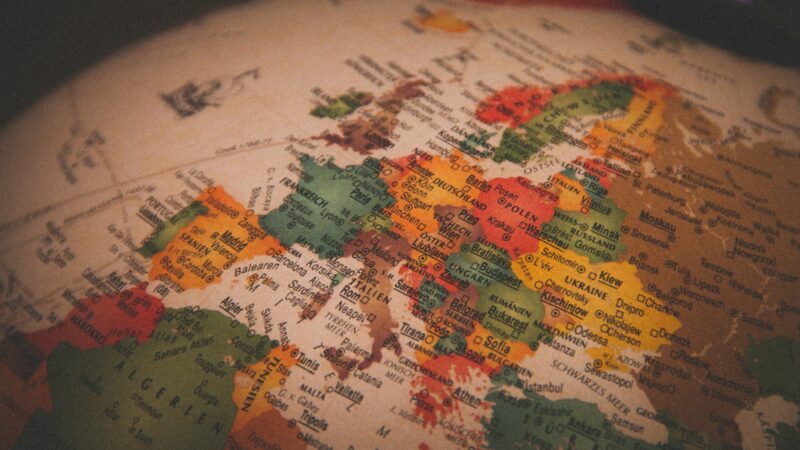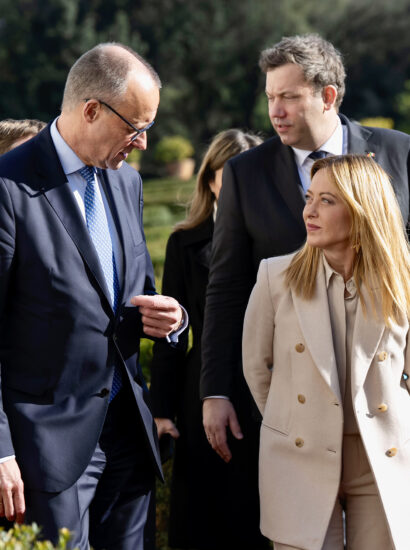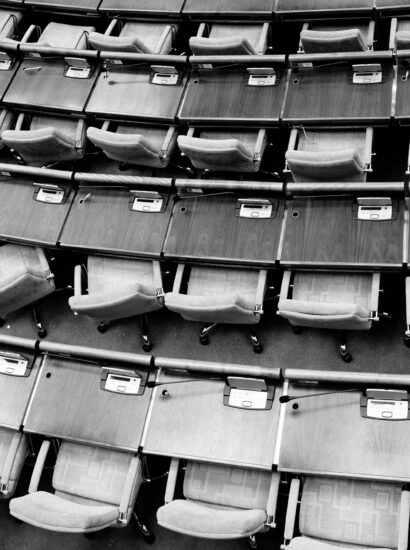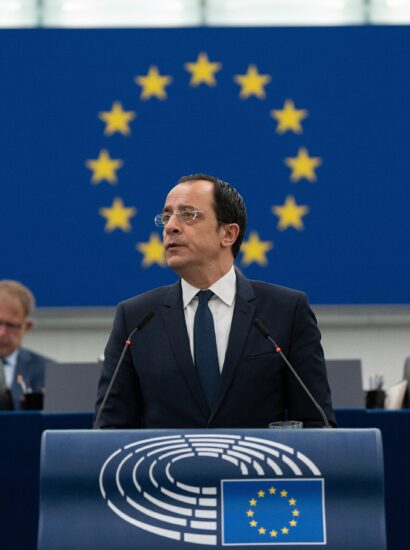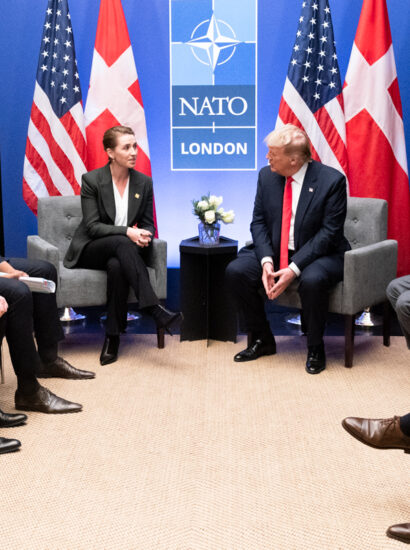At a time when the hotline between the US and Russia is having its comeback and, in addition to tariff decisions and economic warfare, many consider a military escalation of conflicts to be increasingly likely. European heads of state often catch themselves just watching from the sidelines.
Trump’s infamous remark to Ukrainian President Volodymyr Zelensky at his visit to the White House, “you don’t have the cards right now” was perhaps a heated message not only to Ukraine but to all its Western neighbours, a deliberate rejection of the present world order. We might have to return to the logic of political realism when explaining events, which seem to be overturning established conventions: Germany is on the verge of dismantling its decade-long tradition of a stringent debt brake, whilst French President Emmanuel Macron is advocating for a common European defence strategy.
The Unreliable Ally
Since the re-election of US President Donald Trump, the geopolitical landscape has been shifting, and his statements suggest a realistic risk of Europe losing its strongest ally. Trump’s criticisms of the financing of NATO – “I think NATO as a concept is good, but it is not as good as it was when it first evolved,” dates back to 2016. He even highlighted that the then-emerging conflict in Ukraine affected mainly Europe – which is true in geographical terms, so should predominantly be handled by Europe. The back and forth of the last few weeks, in which the US first withdrew pivotal military and intelligence support to Ukraine and then, after more appeased talks, reintroduced it, leaves room for hope, but underlines the fact that Trump’s style of government is unpredictable and unreliable.
This pushes Europe to take greater responsibility for its own defence, including increased military spending and stronger armed forces. This expectation has been a consistent theme in U.S. foreign policy, spanning multiple administrations. The thing that has changed radically since Trump’s inauguration in January is that he threatens to reduce military presence in Europe or leave NATO if member states don’t meet defence spending targets. Just a month ago, US Defense Secretary Pete Hegseth called Poland a model ally, acknowledging its rearmament, and simultaneously warning other Europeans not to assume that America’s presence will last forever.
The latter illustrates the new standpoint of US foreign relations: the rules of the old world order in which military aid was guaranteed due to shared values no longer applies.
This Trumpian diplomacy will perhaps not bring annihilation, but if we have learnt one thing, it is that optimistic assumptions should not be the basis for action during the second Trump administration.
The French Vision of European Deterrence
Either way, most heads of state believe that Europe will benefit from rearmament, regardless of whether the US ultimately remains on its side. It must be noted that the European wing of the NATO alliance includes countries such as Iceland, which hardly have any troops, as well as crucial troop contributors such as the United Kingdom, France, Germany and Poland. These have different strengths, the latter two in land forces, the UK and France in the navy. In total, the Europeans have almost 1.5 million soldiers – nearly as many as Russia intends to have at the end of this year. However, due to deviating military structures, it is not easy to compare these figures, it only gives us a rough picture.

President Donald J. Trump holds a bilateral meeting with French President Emmanuel Macron, Monday, February 24, 2025, in the Oval Office of the White House (Photo: Molly Riley)
Macron has been at the forefront of initiatives to strengthen European defence capabilities and revive the strategic debate on putting the French nuclear arsenal at the service of European security. France possesses a robust nuclear deterrence capability, known as the “force de dissuasion”, designed to protect the country’s “vital interests”, and intended solely for defence. France and the UK are the only European NATO countries possessing nuclear forces, but what is unique about the French is that they are not integrated into NATO’s command structures. For instance, France is not part of the NATO Nuclear Planning Group, and the country also does not rely on other countries for the design and manufacturing of all forces – unlike the UK who depend on American-produced weaponry. This autonomy means that the French President maintains independent control over the country’s nuclear arsenal, being the only person in charge of assessing France’s vital interests. What Macron is suggesting is not the abandoning of the doctrine of specific employment, the arsenal will remain in the service of France only, and he certainly is not suggesting a Europeanisation of control over the country’s nuclear arsenal. He merely demonstrated readiness to discuss how French nuclear weapons could contribute more to the European continent’s defence, taking a step further than presidents before him who have since decades highlighted the European dimension of French security interests.
Macron’s proposal may be crucial in discussing and developing a European deterrence strategy. Since his election in 2017, the president has advocated for a common security framework, a concept in which the French nuclear arsenal and the German-led European Sky Shield Initiative (ESSI) should be included. The latter is a project announced by German Chancellor Olaf Scholz in August 2022 as a concretisation of the Zeitenwende (“times-turn”), aiming at expanding European military capability through the joint acquisition, use and maintenance of air defence systems. The UK and Turkey, and even Austria and Switzerland are a part of ESSI. France and Italy are noteworthy absentees, who are especially opposed because of the reliance on non-European technology, which is according to Paris incompatible with the objective of European sovereignty.
Germany’s Path Towards Rearmament
Since the 1990 Two-Plus-Four Agreement which allowed the reunification of Germany, the Federal Republic’s armed forces personnel must not exceed 370 000, and the country is to renounce from the control and possession of nuclear, biological and chemical weaponry. These restrictions are significant but do not explain the decade-long lack of investment in the Bundeswehr, resulting in their miserable situation. As a result of the Zeitenwende, Germany has taken up a one-off special fund of €100 billion for military investments in 2022. This money has since been invested in F-35 fighter jets, and transport helicopters from the US, as well as a new digitalisation reform to modernise structures. Currently, the American-Israeli Arrow-3 anti-ballistic missile obtained in November 2023 is about to be deployed. Although German weapon manufacturers are producing a significant proportion of the purchase orders, European allies criticise the Federal Ministry of Defence for not shying away from investing in US-produced weaponry, hereby increasing reliance on the US.
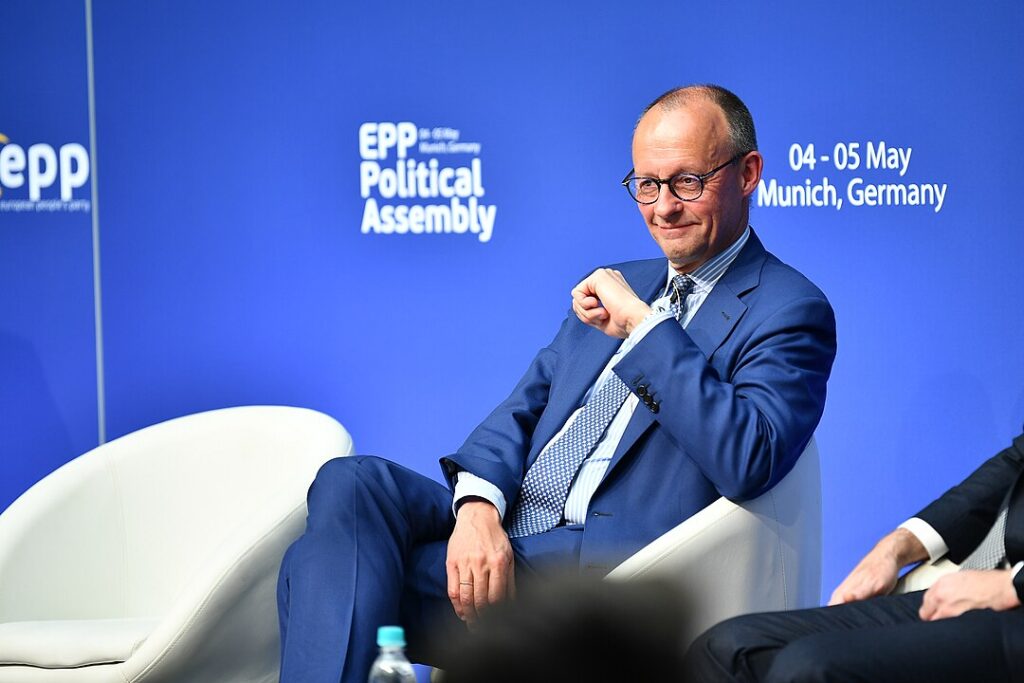
CDU leader Friedrich Merz at a meeting of the European People’s Party in 2023 (Source: EPP/Wikipedia Commons)
After the snap elections in February this year, the likely next chancellor Friedrich Merz (CDU) is leading coalition negotiations with SPD. What the two parties have agreed on thus far is a financial package, which would relax the debt brake for defence spending. The fiscal rule was enacted in 2009 under Chancellor Angela Merkel (CDU) and limits the issuance of government debts to 0.35% of GDP. The ordoliberalist Christian Democrats have been in favour of the act up until now, but recent geopolitical happenings seem to undermine this tradition, and not least Merz’s election campaign promises. According to the amendment, the amount of defence expenditure exceeding 1.0% of GDP is not to be considered in the debt rule, which means such spending above €44 billion would be allowed to be financed by borrowing, limited only by political majorities, but not law. The reform requires constitutional changes and hence a two-thirds majority in both the Bundestag, the federal parliament, and the Bundesrat, the body representing the federated states. On March 19th, the constitution amendment was passed by the incumbent parliament. After passing the Bundestag, the Bundesrat also has to approve the reform, but the path to significantly higher military spending seems paved.
Alternative Sources of Funding
Following Russia’s invasion of Ukraine, the EU and the UK, froze approximately €300 billion worth of Russian central bank reserves and seized assets from sanctioned Russian oligarchs. The EU is already working on a mechanism to allocate interest earnings from €210 billion in assets held in the Belgium-based securities depository Euroclear, equalling an estimated €3 billion per year to Ukraine. Whilst it is legal under international law, this risks discouraging investors from entrusting their assets to an entity that might confiscate them. The argument is that Europe’s geopolitical interests might outweigh this. Particularly the UK has advanced in debates exploring legal pathways for repurposing part of the assets for defence and security purposes, knowing that a full confiscation would face both political and legal challenges.
The European Union, while traditionally focused on economic and political integration, is now also taking active steps toward financing common defence initiatives. At the beginning of March, European Commission President Ursula von der Leyen unveiled the “ReArm Europe” initiative , an €800 billion plan compromising measures to allocate EU funds to defence and facilitating investments for member states and the European Investment Bank.
Europe does stand at a critical juncture, compelled to assume greater responsibility and redefine its role amidst uncertainty and shifting geopolitical dynamics. It is important to note that the volatility of the political situation in each country, with anti-European voices gaining approval, has to limit trust in the stability of all mentioned propositions and actions. Whether joint efforts toward a more autonomous security network will take place in the name of shared values and European solidarity or national interest, might be secondary. In the end, Europe will certainly further expand its strength, as military force once again seems to be deciding who gets to sit at the table.

